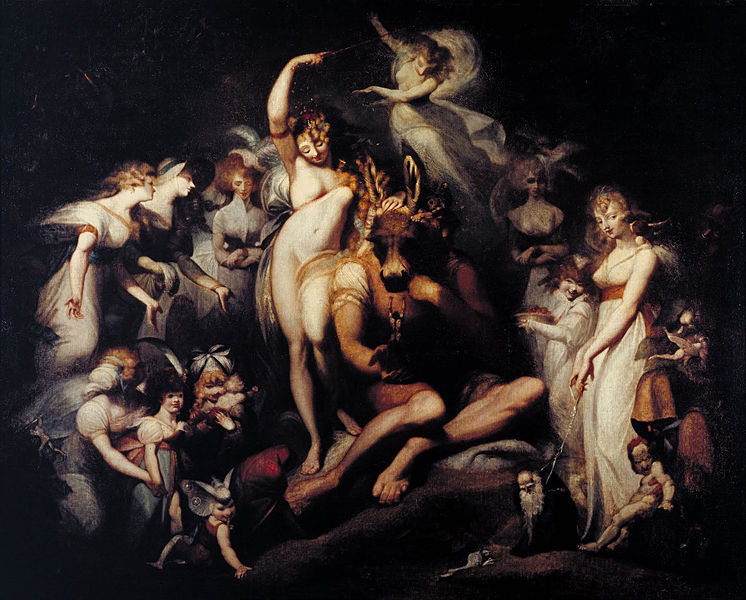
Titania and Bottom (c. 1790) by Henry Fuseli (1741–1825).
No, behoove is not a spell from an evil wizard that causes one to grow hooves or in some way look like a character in one of Henry Fuseli’s paintings. (Maybe it should be, but we can debate that another time.) Behoove is a not all that commonly used verb. It means that something is necessary, proper, ethical, or worthwhile. Modern usage combines it with an object:
It behooves you to brush your teeth before going to bed.
It behooves the jury to listen to the testimony of witnesses.
An archaic form of behoove, meaning to be proper, does not take an object. For example:
Accuracy is a quality that behooves in accountants.
That sentence is rather wordy and awkward sounding. Not surprising that we don’t use behoove that way anymore. Behoove is the verbal form of the even more uncommon noun behoof, which means advantage or benefit. For example:
He took the food for his own behoof.
As a challenge, try working behoof into everyday conversation. It behooves us all to improve everyone’s vocabulary.
Behoove derives from Middle English behoven, which comes from Old English behōfian, meaning to have need of or have use for. As in modern English, it was the verbal form of the noun behoof. Behoof derives from Middle English behove, which comes from Old English bihoflic, meaning useful. The existance ofbihoflic suggests there was a word *bihof, meaning advantage or utility, deriving from Proto-Germanic*bi-hof, meaning a requirement or obligation. Cognates exist in various Germanic languages such as Old Frisian bihof, Dutch behoef, and Middle High German bihuof, all of which mean an advantage, benefit, or useful thing.
Are you wondering about the relationship of behoof and behoove to hoof, as in a horse’s hooves? Hoof derives from Old English hof, meaning hoof, which comes from the Proto-Germanic *hofaz. It appears the words have always had a similar sound and spelling but no common origin. Pity. Going from hoof to behoof would have been a very interesting word story. However, it does behoove a rider to clean a horse’s hooves.
Attribution: Henry Fuseli [Public domain], via Wikimedia Commons.


I learned something today.
Good to hear from you, Jeff!
This word has always cracked me up when I hear people using it (usually only on TV). It’s interesting to know where it came from. Thanks!
My mom uses the word “behoove” now and then. She used to try to use a new word a week and I think she actually likes using “behoove.” I might try using it this week . . . but I know that using “strange” words can be awkward, even when those words aren’t as awkward as “behoove.” I was once told that I was trying to be clever and show off my vocabulary, and I didn’t even know what vocabulary the critic was talking about . . . some word or words that I had actually used for so long that I didn’t know they were peculiar or clever.
I appreciate your lessons in word craft and word history, Jeff!
People really should use this word more, or at the very least, create an evil wizard spell for it!
I like the word behoove, but I haven’t thought of using behoof before. And now I think the word should be used by wizards. *grins*